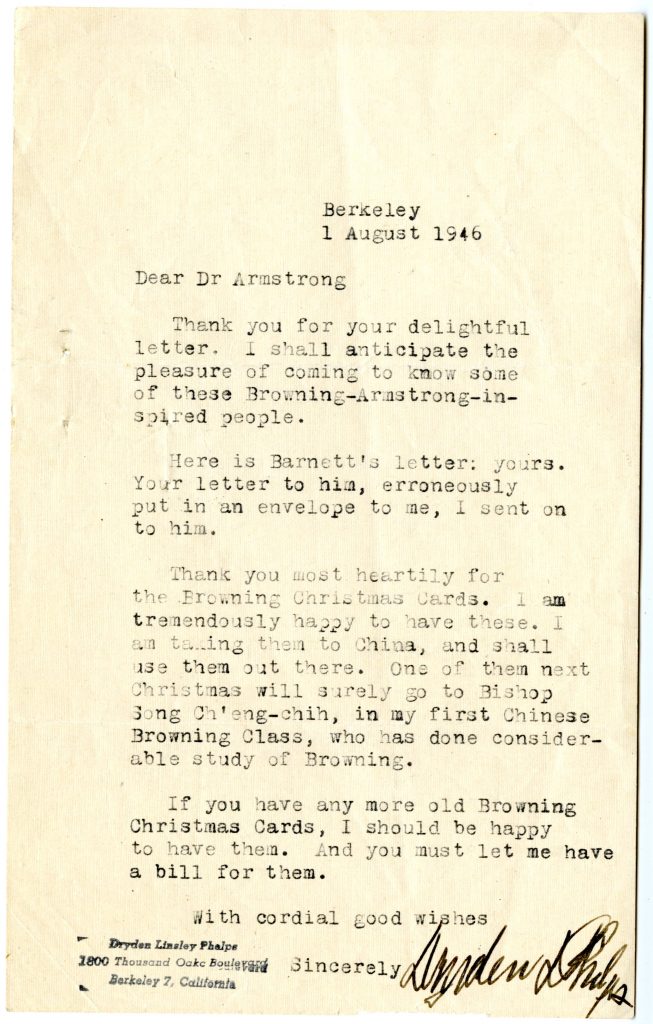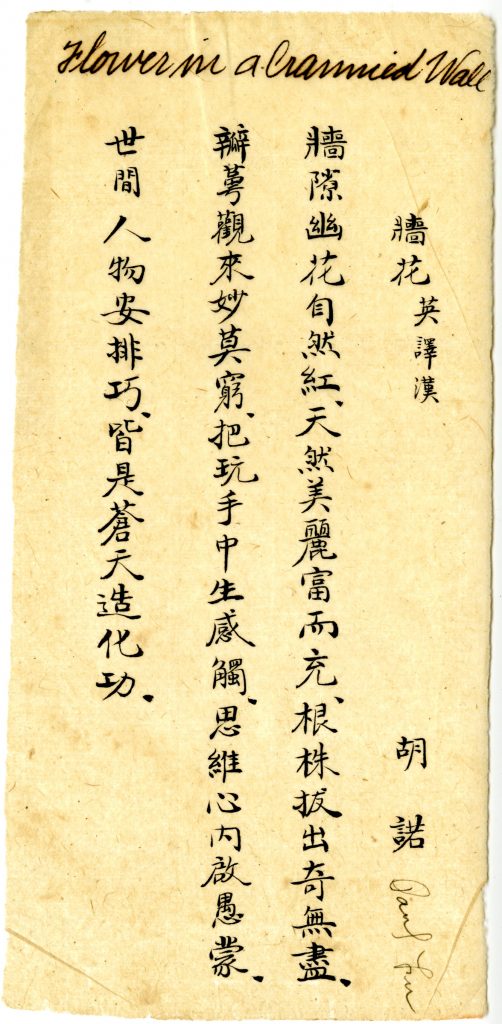Borrowing its title from a collection of essays by C. S. Lewis, this series, “They Asked For A Paper,” highlights interesting items from the Armstrong Browning Library’s collection and suggests topics for further research.
By Melinda Creech
Manuscripts Specialist, Armstrong Browning Library
In preparing the Victorian Letters and Manuscripts of the Armstrong Browning Library for digitization, I came across these five Chinese manuscripts, which according to the note on the items, were donated by Dryden Linsley Phelps, nephew of William Lyon Phelps. William Lyon Phelps was Emeritus Professor of English Literature at Yale University and a distinguished Browning scholar. The Fano Club was begun by Phelps. The club is a group of people who have traveled to Fano, Italy, viewed the guardian angel painting, L’Angelo Custode, (1640) by Giovanni Francesco Barbieri, in the Civic Museum, and sent back to the Armstrong Browning Library a postcard from Fano. The club meets for dinner on Robert Browning’s birthday, May 7, and for a reading of Browning’s poem, “The Guardian Angel,” performed by the youngest member of the club. Phelps commissioned and donated a copy of the painting of “The Guardian Angel” to the ABL. Robert Browning’s desk chair, a gift to Phelps from his students, has also been on loan to the ABL since 1989.
William Lyon Phelps’s nephew, Dryden Linsley Phelps, was a Baptist missionary to China at the West China University, Chen-tse, Szechuan, China, a translator, and a mountain climber. Dryden Linsley Phelps’s son was also named William Lyons Phelps II, in honor of his distinguished uncle.
In this letter to Dr. A. J. Armstrong, Dryden Phelps thanks Armstrong for a Browning Christmas card and shares that he intends to pass the card along to the Chinese bishop who had “done considerable study of Browning.”
Thank you most heartily for the Browning Christmas Cards. I am tremendously happy to have these. I am taking them to China, and shall use them out there. One of them next Christmas will surely go to Bishop Dong Ch’eng-chih, in my first Chinese Browning Class, who has done considerable study of Browning.
These Chinese manuscripts were a gift to the ABL from Dryden Phelps, the Baptist missionary to China.
This hymn is based on the text from Isaiah 43: 5-7.
Fear not: for I am with thee: I will bring thy seed from the east, and gather thee from the west;
I will say to the north, Give up; and to the south, Keep not back: bring my sons from far, and my daughters from the ends of the earth;
Even every one that is called by my name: for I have created him for my glory, I have formed him; yea, I have made him. (KJV)
This handwritten hymn is based on Robert Browning’s poem, “Rabbi Ben Ezra.”
Then, welcome each rebuff
That turns earth’s smoothness rough,
Each sting that bids nor sit nor stand but go!
Be our joys three-parts pain!
Strive, and hold cheap the strain;
Learn, nor account the pang; dare, never grudge the throe! (31-36)
The next three manuscripts are translations of Alfred Tennyson’s poem, “Flower in a Crannied Wall.”
Flower in the crannied wall,
I pluck you out of the crannies,
I hold you here, root and all, in my hand,
Little flower—but if I could understand
What you are, root and all, and all in all,
I should know what God and man is.
The Armstrong Browning Library would be grateful for translations of any of these manuscripts? Does anyone recognize the signatures on the two translations of “Flower in a Crannied Wall?” Are there other Chinese Hymns that are based on texts of Robert Browning’s poems? Does anyone know when these manuscripts came to be gifted to the Armstrong Browning Library? Could anyone suggest a date for any of these manuscripts?









I am so glad to come across this piece of document that record some activities from WCUU. I am a medical graduate from West China University of Medical Sciences in 1986. The university changed names multiple times.
I wonder if you can help to locate descendants from Dryden Phelps.
Thank you.
Hello Melinda:
My grandparents were close colleagues of Dryden Phelps, and my grandmother co-authored a translation of Chinese poetry with Dryden that was published in the USA. My interpretation of these hymns is that they are samples of translations done by students in the class that Dryden mentions, at West China Union University, which is now incorporated into Sichuan University in Chengdu. I have lots of photographs of Dryden if you’d be interested in having a digital copy to go with these records.
Yours, Cory Willmott